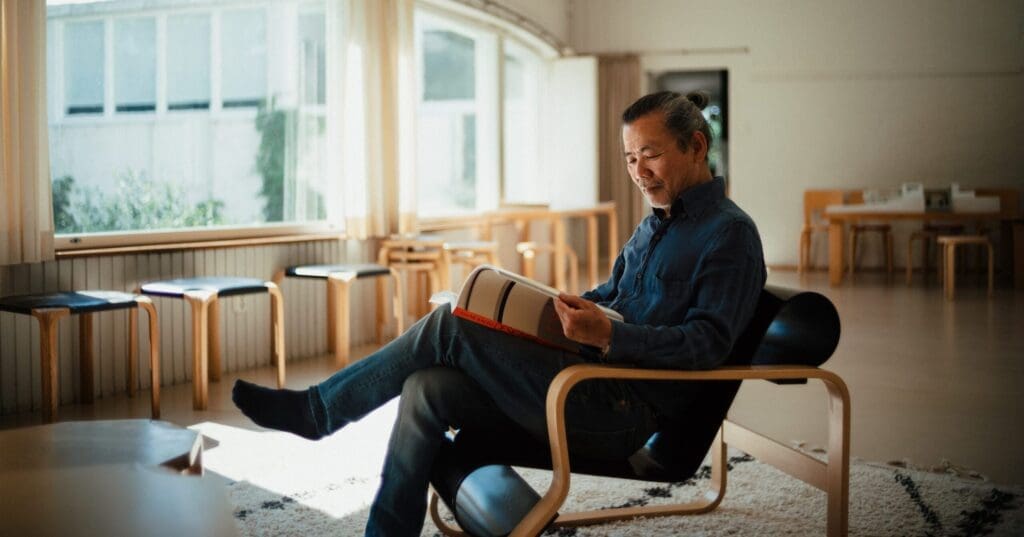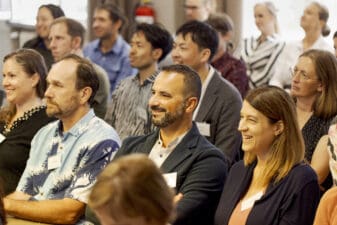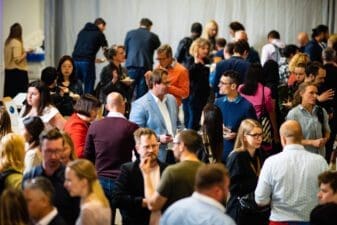23 Circular economy companies driving innovation in Finland
23 circular economy companies in Helsinki that are leading the way towards a greener future. From sustainable fashion to innovative packaging solutions, explore the diverse range of businesses revolutionizing industries while promoting sustainability.

8 min read
Interested in the Founders to Finland programme?
Our business advisor Xin Wang can help.
Helsinki: A hub for circular economy companies
Embracing sustainability and innovation
Finland ranked as the happiest country in the world for six consecutive years, has established itself as a thriving ecosystem for circular economy businesses. With a commitment to sustainability and strong government support, Finland has become a hub of innovation, leading the way in various industries.
In this article, we will explore 20 circular economy companies in Finland that are at the forefront of driving sustainable innovation. From pioneers in sustainable fashion to innovators in circular packaging and waste management, these companies exemplify Finland’s dedication to creating a greener and more circular future.
Revolutionizing the Fashion Industry: Pioneers of circular textiles
The fashion industry faces a pressing challenge in addressing textile waste and achieving true circularity. Currently, only 2% of post-consumer textiles in Europe are diverted to fibre-to-fibre recycling, highlighting the urgent need for scalable solutions.
The environmental impact of fast fashion is becoming a significant and rapid problem. With fast fashion, clothing has about a one-year lifespan before it ends up in a landfill. As the need to move away from that trend grows, sustainable fashion is on the rise.
In the ever-evolving fashion industry, circular textiles have emerged as a game-changer, revolutionizing the way we approach sustainability. Finland, a hotbed of innovation, is home to pioneering companies that are at the forefront of this transformative movement
Infinite Fiber: Transforming Trash into Premium Textile Fibers
Infinite Fiber utilizes its groundbreaking technology to convert landfill-bound waste into high-quality textile fibres. Partnerships with fashion giants like H&M, Patagonia, and Wrangler have helped propel their trademarked super fibre, Infinna™, into the mainstream.
Touchpoint: Turning Textile and Plastic Waste into Sustainable Workwear
Touchpoint addresses the issue of textile waste by transforming it into raw material for sustainable workwear. By providing a solution for reusing discarded textiles, Touchpoint is at the forefront of promoting circularity in the fashion industry. Finland alone produces more than 70 million kilograms of waste textiles each year. Textile waste can’t be reused if it goes straight to an incinerator. To make matters worse, workwear is often made from polyester, a plastic that has a very low recycling rate. Touchpoint provides its customers with the opportunity to turn waste into raw material.
Spinnova: Sustainable Material from Wood, Without Harmful Chemicals
Spinova aims to replace synthetic textiles and cotton by spinning fibre from wood pulp creating a new sustainable material made without harmful chemicals. Inspired by how spiders weave their webs, Spinnova takes cellulose, nature’s most brilliant building material, and aligns it in an optimal way. Partnering with fashion brands like Marimekko, Fashion FWD, and H&M Group, Spinnova is making waves in the sustainable fashion space.
Ioncell: Sustainable Textile Fibers from Used Textiles and Pulp
Ioncell has developed an eco-friendly technology that transforms used textiles, pulp, and even old newspapers into new textile fibres without the use of harmful chemicals. Their process offers an environmentally friendly alternative to water-intensive cotton production, revolutionizing the recycling of textile waste. The process may revolutionise the reusing and recycling of textile waste, as waste cotton can get a new life as high-quality luxury fibres. Ioncell® is a research project developed at Aalto University in collaboration with the University of Helsinki. They have been developing the Ioncell® technology for nearly ten years.
Rens: Sneakers Made from Recycled Coffee Cups and Plastic Bottles
Rens, founded by sneaker enthusiasts Jesse Tran and Son Chu, tackles the environmental impact of the global sneaker industry. By incorporating waste materials like 21 cups of coffee and six plastic bottles into each pair of sneakers, Rens offers stylish and sustainable footwear options.
Metsä Spring: Developing Sustainable Textile Fibers from Finnish Wood
Metsä Spring, in collaboration with the Japanese ITOCHU Corporation, is developing Kuura, a textile fibre derived from Finnish wood. Their unique demo plant in Äänekoski, Finland, serves as a testing ground for this innovative production method.
Innovations in Circular Packaging and New Materials
Finland’s expertise in developing new sustainable materials is evident in the realm of circular packaging and new materials. Many of the innovators in this field are spin-off startups from VTT Technical Research Centre of Finland.
These pioneering companies in Finland demonstrate the country’s commitment to sustainable innovation across various industries, showcasing its potential to lead the way in circular packaging, new materials, and even nutrition production.
Sulapac: Biodegradable Packaging Made from Plant-Based Materials
Sulapac provides a sustainable alternative to conventional plastic packaging. Their biodegradable plant-based binders and wood materials can be processed using existing plastics machinery, making it a cost-effective and eco-friendly choice for various industries. This enables large-scale production without significant investments in new machinery and makes sustainability an easy choice.
There are limitless possibilities with Sulapac, and many companies are already using their line of biodegradable packaging for products such as cosmetics, food, and jewellery. Sulapac has also won several sustainability awards and is backed by big brands such as Chanel.
Paptic: Bio-based Material Combatting Plastic Waste
Paptic tackles the global issue of plastic waste by manufacturing bio-based materials from cellulose. Their recyclable and biodegradable bags and packaging can be produced using modified existing paper machines, reducing environmental impact. The two largest department stores in Finland—Sokos and Stockmann—are already using Paptic for their shopping bags.
Woodio: Waterproof Solid Wood Composite for Sustainable Bathrooms
Woodio has developed the world’s first 100% waterproof solid wood composite made from real wood chips. Their innovative material offers a minimal carbon footprint and addresses sustainability challenges in the bathroom industry.
The ceramic industry is among the most polluting industries globally, and Woodio realised there was an opportunity and need to improve the bathroom industry. The Woodio material innovation was inspired by making more sustainable wooden bathroom tiles, and today they have a line of bathroom sinks, bathtubs, and other bathroom accessories.
ExpandFibre: Upgrading Renewable Resources into Sustainable Bioproducts
Fortum and Metsä Group’s R&D collaboration, ExpandFibre, focuses on upgrading renewable resources like pulp fibres, hemicellulose, and lignin into sustainable bioproducts. Their mission is to meet the increasing demand for eco-friendly textile fibres and other value-added biomaterials.
RePack: Reusable Packaging Solutions for E-commerce
RePack revolutionizes packaging by introducing a “reuse as a service” model. With RePack, e-commerce companies can share packaging among a pool of webstores, reducing single-use packaging waste and promoting a circular approach.
Palpa: Bottle Return System Boosting Recycling Rates
Palpa administers a bottle deposit and return system in Finland, boasting the world’s best recycling rates for drink packaging. Consumers receive a fee refund when returning bottles, incentivizing high recycling rates and reducing waste. The development of a bottle return system began in Finland with the arrival of Coca-Cola bottles at the 1952 Olympic Games. The system is based on a fee that is returned to the consumer when they return a bottle or other drink packaging. In Finland, the recycling rate of aluminium cans is a whopping 96%.
Innovative Solutions for Waste Reduction and Management
Throughout Finland’s history, waste management has evolved through collaboration between municipalities, private waste companies, and producer corporations. The development of a modern, holistic, and effective waste management system has been significantly influenced by legislation.
Finland’s waste management journey has laid a strong foundation for fostering sustainable solutions. The transition to a circular economy is now a prominent priority in the waste sector, and Finland continues to lead the way in driving waste reduction, resource efficiency, and innovative approaches to packaging and material sustainability.
ZenRobotics: AI-based Sorting Robots for Efficient Recycling
ZenRobotics leads the way in smart robotic recycling. Their AI-powered sorting robots optimize waste sorting, making recycling more efficient, accurate, and economically viable.
Molok: Neighbourhood Collection System for Increased Recycling
Molok offers municipal waste management companies recycling points for areas made up of larger detached houses. Instead of collecting mixed waste only, Molok’s neighbourhood collection allows residents to collect up to eight types of waste in a common collection point. With the help of Molok’s neighbourhood collection containers, the recycling rate in areas of detached housing can even be doubled from about 25% to 50%.
Netlet: Online Shop Repurposing Surplus Construction Materials
Netlet provides an online marketplace for surplus construction materials, giving them a new life and reducing waste expenses for construction companies. Renovators benefit from lower-cost building materials, fostering sustainability in the construction industry.
Hävikkimestari: Reducing Food Waste in Catering Services
Hävikkimestari, developed by Lassila & Tikanoja, helps reduce food waste in catering services. By minimizing waste, this application lowers raw material costs, saves time, and reduces biowaste charges.
Clewat: Cleantech Solutions for Water Pollution Problems
Clewat focuses on solving plastic waste, excess biomass, oil spills, and other pollution issues in oceans, seas, rivers, and lakes. Their innovative vessels, supported by experts in marine litter, combat water system pollution.
Netlet: Online Shop Repurposing Surplus Construction Materials
Netlet provides an online marketplace for surplus construction materials, giving them a new life and reducing waste expenses for construction companies. Renovators benefit from lower-cost building materials, fostering sustainability in the construction industry.
Hävikkimestari: Reducing Food Waste in Catering Services
Hävikkimestari, developed by Lassila & Tikanoja, helps reduce food waste in catering services. By minimizing waste, this application lowers raw material costs, saves time, and reduces biowaste charges.
Riverrecycle: Sustainable River Cleaning Services
Riverrecycle offers sustainable river cleaning services to national and local governments, eliminating the need for constant funding. Their goal is to install 500 river-cleaning solutions over the next five years, preventing 60% of river-borne plastic waste from entering the oceans.
Products as a service
Product-as-a-Service (PaaS) is a pivotal business model that plays a vital role in facilitating the transition to a circular economy. It presents companies with a tangible opportunity to decrease reliance on new resources while striving towards their sustainability objectives. PaaS models promote resource efficiency and the prolonged utilization of products by incentivizing durable operations.
By retaining ownership of the product, companies can exercise control over maintenance, repair, and end-of-life management processes. Instead of customers paying for product ownership, they are charged for access to the product’s functionality or a specific outcome. This shift from ownership to access aligns with the principles of the circular economy, encouraging a more sustainable approach to consumption and reducing waste generation. PaaS models empower businesses to extend the lifespan of products, minimize resource extraction, and contribute to a more sustainable future.
3 Step IT: Leasing and Refurbishing IT Equipment
3 Step IT leases office equipment to organizations and manages nearly 2 million IT devices. After the leasing period, they refurbish and resell the used equipment, ensuring that 97% of returned devices find a new home. The remaining 3% is usually faulty or broken equipment and is responsibly recycled.
MaaS Global: Mobility as a Service Operator
MaaS Global operates the world’s first true Mobility as a Service platform. Their Whim app provides users with access to all city transport services under a single subscription, promoting seamless and sustainable urban mobility.
Sharetribe: Empowering Resource-Sharing in the Sharing Economy
Sharetribe enables individuals and businesses to create online marketplaces without the need for coding skills. This innovative platform fosters resource-sharing within the sharing economy, allowing users to easily connect and exchange goods and services. By facilitating the creation of online marketplaces, Sharetribe promotes efficient resource utilization and encourages a more sustainable approach to consumption.
Naava: Nature and Healthy Indoor Air as a Service
Naava offers a unique service that brings nature and healthy indoor air to various spaces through its intelligent green walls. These innovative walls purify and humidify the air, providing clean and purified indoor environments. Naava takes care of the maintenance through their automated system, ensuring that customers can enjoy the benefits of nature indoors without the hassle of upkeep. By providing nature and healthy air as a service, Naava contributes to improved well-being while promoting sustainable and eco-friendly indoor spaces.
Combi Works: Enabling Efficient Resource Utilization through Factory as a Service
Combi Works revolutionizes manufacturing with its digital sharing platform, AirFaass SCM. They connect businesses in need of production capacity with owners of manufacturing facilities, allowing for efficient resource utilization. By merging manufacturing with the digital world, Combi Works promotes sustainable practices and maximizes the utilization of existing production capabilities. Through its “Factory as a Service” approach, Combi Works drives innovation and fosters a more sustainable manufacturing ecosystem.
Finland: A Thriving Platform for Circular Economy Innovation and Sustainability
Finland’s positive atmosphere and support for innovation, coupled with its thriving forestry industry, make it an exceptional platform for launching circular economy businesses. By leveraging sustainable practices and cutting-edge technologies, these companies are leading the way toward a greener and more circular future.
Apply to become one of the Founders to Finland!
Establish your business in Helsinki to access the EU market, join an innovative tech ecosystem in a value-driven society, and enjoy a famously excellent work-life balance. Experience business and life in the capital of the world’s happiest country.

Related articles
Contact Helsinki Partners
If you are interested in learning more about Helsinki and its possibilities – please contact us via the form here. We’ll make sure to get back to you within a few working days.


